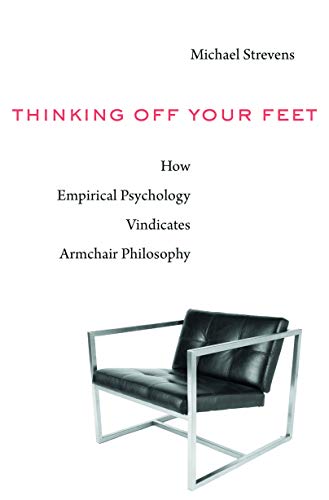If the “theory-theory“ of concepts sketched in the previous post is correct, then we begin the philosophical analysis of a category such as knowledge equipped with nothing more than some rudimentary beliefs about the place of knowledge in the explanatory order. These beliefs may paint a rather partial or even misleading picture, in which case our judgments of category membership may systematically err, just as our “starter concept“ of fish may fail to correctly classify dolphins or eels. While our biological errors can be corrected by experience, armchair analysis has nothing to go on but the starter beliefs themselves.
Is that enough? Edouard Machery, in his recent book Philosophy Within Its Proper Bounds, cites research showing that in the typically rather unusual scenarios that promise to differentiate between competing philosophical views, our starter theories fail to yield determinate, stable judgments. Machery concludes that they lack the reliability needed if armchair analysis is to be a viable philosophical method. I’ll come back to Machery‘s empirical argument at the end of this post. Here is the question I want to ask right now: is there any positive reason to think that our starter theories are reliable guides to category membership?
Philosophers have been grappling with such questions for a long time. Plato thought that our dim memories of the Forms were sufficient to lead us dialectically to their full glory. Descartes argued that our starter concepts were implanted by a benevolent God who could be trusted to give us what we needed.
I’ll see if I can do without any of these sources of outside assistance, throwing in my lot with another grand philosophical tradition, according to which there is something about the nature of reference—about the way our concepts get representationally connected to things in the world—in virtue of which the beliefs that make up a concept have a kind of minimal reliability as instruments of inquiry. One version of this approach appeals to a “principle of charity“. My idea is a little different; it is articulated by what I call the dispositional doctrine of reference:
A term refers, at a given time, to a given kind just in case it is likely that, under ideal conditions, the term’s users would apply the term to all and only instances of that kind.
By “ideal conditions” I mean two things. First, of course, clear thinking, plenty of time to reflect, relentless focus, no silly mistakes. Second and more significantly, access to all relevant evidence (where relevance is determined by the concept possessor). Such evidence can, and often will, result in the possessor’s revising the theory associated with their concept, perhaps profoundly. The dispositional doctrine says, then, that a concept refers to a category just in case the concept-holder would, when fully empirically informed, apply the concept to all and only members of the category.
In spite of the “just in case”, I don’t intend the doctrine as a definition or analysis of reference (well, not today). Rather I suggest, it is true on any possible theory of reference, descriptivist, causal-historical, or whatever—or at least, any theory of reference that respects the sentiment above that we get no outside help in attaching our thoughts and words to the world.
To see why, suppose that the dispositional doctrine is false for some concept C of category K at time t. Then at t there is no realistic prospect of C’s possessors finding out what it is that they are thinking about, either at that moment or at any point in the future, even at the “end of science“ when they know everything about the world that it is possible to learn empirically. In that case, C’s ability to pick out K apparently transcends the knowable facts. How did C and K get together? They must have had a helping hand, and a rather ghostly one at that.
If the dispositional doctrine is granted, it follows that a sufficiently motivated investigator has a better than even chance—perhaps much better than even—of figuring out what categories are picked out by their concepts. It does not follow that their starter theories are true, or even mostly true—just that, even if false, they contain enough clues to get to the truth. Nor does the dispositional doctrine tell you what methods to use. You should try all available methods. If armchair analysis is the only such method, however, then the doctrine guarantees that it is likely to work.
What about the Machery’s argument from experimental philosophy for the unreliability of case judgments? That argument takes instability and context sensitivity in case judgments to be evidence for their unreliability. But if the dispositional doctrine is correct, then ineradicable instability and so on is rather evidence that there is no matter of fact about the scenario in question—no matter of fact, that is, as to whether it exemplifies the philosophical category under investigation. In such cases, the investigator is not missing, or worse being misled, as to the valence of some crucial piece of evidence. The scenario is simply one that is not very helpful to the analyst.
It will not have escaped your notice that the plausibility of the dispositional doctrine rests on philosophical reasoning—perhaps even on the philosophical analysis of reference. My vindication of analysis therefore has a circular aspect. I think that is, sadly, the best we can do. Science, thanks to the problem of induction, is in the same boat. Armchair philosophy could have worse company.

